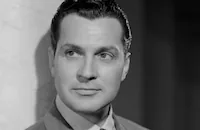Turner Classic Movies will honor the passing of Hollywood action star Charles Bronson on Saturday, Sept. 13, with a four-film tribute.
After years of playing supporting roles in numerous Western, action and war films, including THE MAGNIFICENT SEVEN (1960, 8 p.m.) and THE DIRTY DOZEN (1967, 1:15 a.m.), Bronson finally achieved worldwide stardom as a leading man during the late 1960s and early 1970s. TCM's tribute will also include THE GREAT ESCAPE (1963, 10:15 p.m.), Bronson's second teaming with Steve McQueen and James Coburn, and will conclude with FROM NOON TILL THREE (1976, 4 a.m.), co-starring Jill Ireland. TCM will alter it's prime-time schedule this Saturday, Sept. 13th. The following changes will take place: 8:00 PM - The Magnificent Seven (1960)10:15 PM - The Great Escape (1963)
1:15 AM - The Dirty Dozen (1967)
4:00 AM - From Noon Till Three (1976) Charles Bronson, 1921-2003
Charles Bronson, the tough, stony-faced actor who was one of the most recognizable action heroes in cinema, died on August 30 in Los Angeles from complications from pneumonia. He was 81.
He was born Charles Buchinsky on November 3, 1921 in Ehrenfeld, Pennsylvania, one of fifteen children born to Lithuanian immigrant parents. Although he was the only child to have graduated high school, he worked in the coalmines to support his family until he joined the army to serve as a tail gunner during World War II. He used his money from the G.I. Bill to study art in Philadelphia, but while working as a set designer for a Philadelphia theater troupe, he landed a few small roles in some productions and immediately found acting to be the craft for him.
Bronson took his new career turn seriously, moved to California, and enrolled for acting classes at The Pasadena Playhouse. An instructor there recommended him to director Henry Hathaway for a movie role and the result was his debut in Hathaway's You're in the Navy Now (1951). He secured more bit parts in films like John Sturges' drama The People Against O'Hara (1951), and Joseph Newman's Bloodhounds of Broadway (1952). More substantial roles came in George Cukor's Pat and Mike (1952, where he is beaten up by Katharine Hepburn!); Andre de Toth's classic 3-D thriller House of Wax (1953, as Vincent Price's mute assistant, Igor); and De Toth's fine low-budget noir Crime Wave (1954).
Despite his formidable presence, his leads were confined to a string of B pictures like Gene Fowler's Gang War; and Roger Corman's tight Machine Gun Kelly (both 1958). Following his own television series, Man With a Camera (1958-60), Bronson had his first taste of film stardom when director Sturges casted him as Bernardo, one of the The Magnificent Seven (1960). Bronson displayed a powerful charisma, comfortably holding his own in a high-powered cast that included Yul Brynner and Steve McQueen. A few more solid roles followed in Sturges' The Great Escape (1963), and Robert Aldrich's classic war picture The Dirty Dozen (1967), before Bronson made the decision to follow the European trail of other American actors like Clint Eastwood and Lee Van Cleef. It was there that his hard, taciturn screen personae exploded in full force. In 1968 alone, he had four hit films: Henri Verneuil's Guns for San Sebastian, Buzz Kulik's Villa Rides, Jean Herman's Adieu l'ami which was a smash in France; and the classic Sergio Leone spaghetti Western Once Upon a Time in the West.
These films established Bronson as a huge box-office draw in Europe, and with some more stylish hits like Rene Clement's Rider on the Rain (1969), and Terence Young's Cold Sweat (1971) he soon became one of the most popular film stars in the world. It wasn't easy for Bronson to translate that success back in his homeland. In fact, his first few films on his return stateside: Michael Winners' Chato's Land, and The Mechanic (both 1972), and Richard Fleischer's Mr. Majestyk (1973), were surprisingly routine pictures. It wasn't until he collaborated with Winner again for the controversial Death Wish (1974), an urban revenge thriller about an architect who turns vigilante when his wife and daughter are raped, did he notch his first stateside hit. The next few years would be a fruitful period for Bronson as he rode on a wave of fine films and commercial success: a depression era streetfighter in Walter Hill's terrific, if underrated Hard Times (1975); Frank Gilroy's charming offbeat black comedy From Noon Till Three (1976, the best of many teamings with his second wife, Jill Ireland); Tom Gries tense Breakheart Pass; and Don Siegel's cold-war thriller Telefon (1977).
Sadly, Bronson could not keep up the momentum of good movies, and by the '80s he was starring in a string of forgettable films like Ten to Midnight (1983), The Evil That Men Do (1984), and Murphy's Law (1986, all directed by J. Lee Thompson). A notable exception to all that tripe was John Mackenzie's fine telefilm Act of Vengeance (1986), where he earned critical acclaim in the role of United Mine Workers official Jack Yablonski. Although he more or less fell into semi-retirement in the '90s, his performances in Sean Penn's The Indian Runner (1991); and the title role of Michael Anderson's The Sea Wolf (1993) proved to many that Bronson had the makings of a fine character actor. He was married to actress Jill Ireland from 1968 until her death from breast cancer in 1990. He is survived by his third wife Kim Weeks, six children, and two grandchildren.
by Michael T. Toole




















